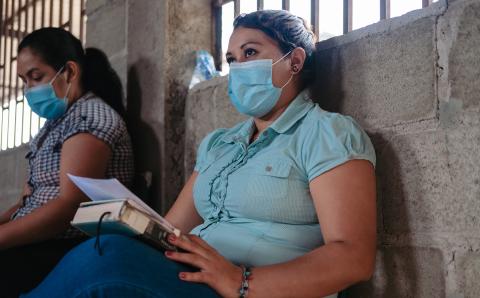Love them or hate them, surveys are part of our everyday life. From government-endorsed censuses to customer feedback forms, we are regularly asked to provide input to help inform and improve products and services. Employers use surveys to measure employee engagement and satisfaction. Even churches use surveys to gather information that can be used to help us going forward.
The Christian Reformed Church in North America sends out regular requests to congregations, pastors, and ministry leaders to ask for feedback in a variety of areas. Ministries also note what resources are being used, what websites are being visited, and what questions are being asked.
But what is this information used for? And is it really worth it to participate? The following pages show a few examples of data that was collected and how that information has been used to improve ministry.
A Church Yearbook
- Research type: denominational Yearbook survey of individual congregations
- Frequency: once per year in August or September
- Types of information: pastor name, title, and contact information; church mailing address, phone number, and email address; average attendance, church membership, baptisms, and deaths; languages spoken during worship; accessibility features such as sign language, hearing loop, and barrier-free access; safe church policies and procedures
“There are so many reasons for churches to participate in the annual Yearbook survey,” said Rebekah Vanden Akker, Yearbook coordinator for the CRCNA. “Membership statistics change from year to year; staff changes happen; service times, websites, and email addresses are frequently updated. The annual survey allows congregations to confirm or update information to make sure that the public listing is accurate.”
The public listing Vanden Akker refers to includes the Church Finder tool on the denominational website (crcna.org/churches). The page is visited every year by people looking to find a Christian Reformed congregation to attend. By typing in a city and state or province, visitors to the site can see all of the congregations within a certain geographical radius. They can also filter their search by language or accessibility features, and they can find accurate information about worship times and which congregations offer services by livestream.
In 2022, the church finder page was visited 42,585 times, and individual congregation pages received 271,534 visits.
But the Yearbook survey is also used to calculate minister pension amounts, capture an accurate count of congregations with safe church policies, paint a picture of how well we are meeting the needs of those with disabilities, and much more.
“Every year, we receive requests for copies of past membership numbers from churches, pastor search committees, specialized transitional ministers working with churches, and others. We are only able to provide that information if the church has regularly submitted the Yearbook questionnaire,” said Vanden Akker.
Recently, the Council of Delegates spent time looking at Yearbook data that showed trends in church growth and membership decline. They noted that the growing edge of our denomination is in non-English-speaking churches. (Of the 19 new ministries recorded in the 2023 Yearbook, six were Spanish-speaking and five were Korean-speaking). They also noted a decline in overall membership numbers over recent years and asked CRCNA ministries to put together a proposal for how to address church renewal and growth.
The Survey Says
- Research type: denominational survey
- Frequency: On a rotating schedule, every congregation is surveyed once every five years. The survey opens in February or March.
- Types of information: church health, worship components, individual spiritual practices, support for denominational initiatives, support for Christian education, church satisfaction, demographic information
How often do members of your congregation read the Bible or have personal devotions? Do young people in your church feel as if they are adequately involved in making decisions? Which CRCNA ministries have the greatest impact on your congregation? How healthy is your church in comparison to others?
These are the types of questions on the annual CRCNA denominational survey. The survey began in 1987 and was conducted every five years by what was then Calvin University’s Social Research Center.
In 2017, the survey shifted to an annual cycle, but is only sent to one-fifth of all CRC congregations each year.This way data is collected every year, but each church is asked to actively promote the survey only once every five years. DataWise Consulting, an external social research provider, conducts the survey and analyzes the results to help ensure that information is kept confidential and that the data is properly understood.
Every congregation that solicits at least 20 responses from their members and attendees can request a personalized report that is specific to their church. This helps congregational leaders receive honest, anonymous feedback about the spiritual health and well-being of members and evaluate areas for congregational improvement.
The survey results also help to shape the future of CRCNA ministries, the denominational ministry plan, and the types of resources and programs that are needed to assist congregations.
“One of the most interesting questions to me on the annual survey is about evangelism,” said Amy Schenkel, a regional mission leader for Resonate Global Mission. “The question asks survey participants if their congregation is involved in planting new churches and discipling communities. Only 24% of respondents said that this was ‘true’ or ‘mostly true’ in their context. Another question asks if respondents themselves intentionally build relationships with non-Christians. While this answer was up to 51%, that still leaves 49% of our church members not actively participating in evangelism.”
As a result of these low numbers on recent surveys, church planting became a key emphasis in the denomination-wide ministry plan, Our Journey 2025. In addition, Resonate Global Mission produced Witness, a free downloadable curriculum designed to help churches lead five small-group sessions about missional practices that help us witness in word and deed to our neighbors.
“In conversations with local churches, I hear the desire of people to share the good news with their neighbors, but the ways they’ve been taught to do so feel too threatening. In my own life, I realized I was developing relationships with my neighbors, but I wondered what the next step of verbalizing the gospel should look like with them,” Schenkel said about the idea behind the curriculum.
Since it was made available in September 2021, Witness has been downloaded 278 times.
How Did You Know I Needed That?
- Research type: contact interactions database
- Frequency: ongoing
- Types of information: which congregations denominational ministry staff have visited, what information was presented, what questions were raised, and what resources were requested
“When the right hand doesn’t know what the left hand is doing, it can not only lead to inefficiency and duplication of efforts, but it can also mean missed opportunities,” said Chris Schoon, U.S. director of Congregational Ministries. “That’s why it is essential that CRCNA ministries work alongside congregations. We track the types of work that we are doing.”
To do this, employees and volunteers log interactions in a central database. While details of conversations are kept confidential, general information is recorded so that trends can be observed.
“In the area of pastor-church relationships, we’ve seen an increase in the number of calls we’ve received over recent years,” said Sean Baker, ministry consultant with Congregational Ministries. “Each call is unique and requires its own specific type of response. This is all kept highly confidential, but we do note the number of calls we are receiving and the types of issues they represent. Pastors are feeling burnt out. There is more tension between pastors and their councils. Tracking this data was part of the impetus behind the development of the Challenging Conversations toolkit, Quick to Listen initiative, and the Next Steps discernment process.”
The database also helps staff see where they have been focusing their time and energy and what gaps might exist. For example, in the 2021-22 ministry year, CRCNA staff interacted with 81.73% of all CRC congregations (over 820 churches). These interactions might have included a physical visit to the church to provide training, a webinar or online training on a topic of interest to the church, or a phone call to answer questions and provide assistance.
Lastly, the log helps different staff members understand the full picture of what a congregation might be interested in.
During the height of the pandemic, denominational ministry staff were mobilized to reach out to all CRCNA congregations by phone or email. Staff recorded those interactions with a subject line indicating it was related to the pandemic and made notes about questions, challenges, and opportunities that churches were experiencing. Those notes were used to share stories of what was working well in some congregations, to raise better awareness of the most relevant denominational resources, and to create new resources to help churches get through.
Now that COVID mandates have lifted, denominational staff have again mobilized to call and email pastors to get a picture of what the church looks like post-pandemic and how CRCNA ministries can walk alongside congregations.
“As I spent time meeting pastors on Zoom, a frequent theme that came up was how congregational needs had shifted,” said Becky Jones, regional catalyzer for the CRCNA in the Canada East region. “What has been exciting in the midst of these conversations is hearing from one pastor how they have navigated certain challenges and then listening to another pastor who is just starting the process in a similar situation. Several times we have realized that we have the capacity to connect pastors who may not otherwise be aware of each other’s work. Being able to link pastors to get support from one another has been so gratifying!”
Bytes and Cookies
- Research type: website analytics
- Frequency: ongoing
- Types of information: number of visits, page visits, average visit length, pages shared, search terms used
Every time you visit a website or type in a search term, it generates data that can be helpful to the hosts of that site. This is true for the CRCNA and its ministries too.
“There is a lot of data that you can collect to understand how people interact with your website and identify opportunities for improvement,” explained Tim Postuma, who manages the denominational website (crcna.org). “You can track overall traffic, where that traffic is coming from, new and returning visitors, time spent on site, and much more. This in turn helps us learn how we can improve the user experience and make resources and answers easier to find.”
Consider The Network (crcna.org/Network). It was launched in 2010 as a forum for CRC members to ask ministry questions, share best practices, and find support for their work in local congregations. Today, the site gets about one million page views each year and annually receives more than 3,000 contributions from people across the denomination.
When the site was redesigned in October 2022, user analytics were used to decide which broad topics (e.g., children and youth, church administration, church strategy and mission, spiritual formation, leadership, justice and inclusion, specialized communities, and worship) were needed to organize posts.
“We wanted to organize The Network around broader, more intuitive topics, and we used web analytics to figure that out,” said Staci DeVries, Network administrator. “As a result, the homepage now features a clean and simple navigation bar with topics that make sense in the context of the local church.”
Network staff also recognized the popularity of the site’s job listings page, so they made that its own section. In addition, the “ministry questions and answers” portion became much more prominent in the redesign to foster more church-to-church conversation.
“Back-and-forth ministry sharing is what The Network is all about,” DeVries said. “The redesign simplified the ‘Ask a Question’ form and gave Ministry Q&As homepage prominence. I am happy to report that over 90% of questions asked on the site receive an answer, usually within a very short amount of time.”
As for the most searched for items on The Network, that varies over the course of the year.
“In 2022, we saw a lot of searches for resources and posts related to synod and the human sexuality report,” said DeVries. “What is surprising, however, is that the most popular search term was about organizational restructuring, with ‘SALT report explained’ searched over 220 times! Other popular search terms were ‘church order,’ ‘sermons,’ ‘worship,’ and ‘baptism.’”
About the Author
Kristen deRoo VanderBerg was part of the World Renew Communications team from 1999-2016. She now serves as director of Communications & Marketing for the Christian Reformed Church.









